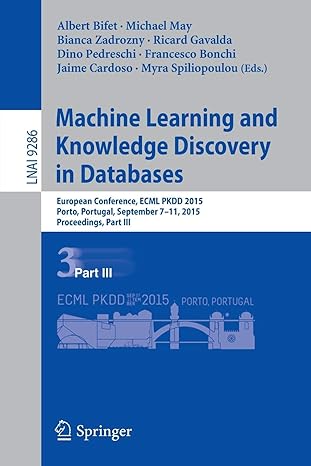Question
Write an merge sort algorithm in C using the given codes. It includes four files: mergeSort.c, mySort.h, metrics.h, metrics.c, and sortDriver.c. Note: You only need
Write an merge sort algorithm in C using the given codes. It includes four files: mergeSort.c, mySort.h, metrics.h, metrics.c, and sortDriver.c.
Note: You only need to modify the mergeSort.c, based on the code for mySort.h, metrics.h, metrics.c, and sortDriver.c. DO NOT modify the code for mySort.h, metrics.h, metrics.c, and sortDriver.c.
Code for mergeSort.c
#include "mySort.h"
void mySort(int array[], unsigned int first, unsigned int last)
{
}
Code for mySort.h
#ifndef MYSORT_H
#define MYSORT_H
#include "metrics.h"
/* The restriction to testing your sort algorithms to collections
* of no more than one hundred thousand elements is encapsulated
* with the following "#define":
*/
#define MAX_SIZE_N_TO_SORT 100000
/* prototype for "sort" function */
void mySort(int data[], unsigned int first, unsigned int last);
#endif /* #ifndef MYSORT_H */
Code for metrics.h
#ifndef METRICS_H
#define METRICS_H
int myCompare(int, int);
void mySwap(int *, int *);
void myCopy(const int *, int *);
unsigned int getNumCompares();
unsigned int getNumCopies();
unsigned int getNumSwaps();
#endif /* #ifndef METRICS_H */
Code for metrics.c /** * The metrics module provides utility functions to compare, swap * and copy ints. The module tracks the number of times each operation * is performed and provides functions to obtain these numbers. * The primary use of the metrics module is to facilitate the * performance measurement and comparison of sorting algorithms. * * The module also includes a stand alone self-test main routine * allowing the automatic testing of its components. The test executable * may be obtained by compiling this module with TEST_METRICS #defined. */ static unsigned int numCompares = 0; static unsigned int numSwaps = 0; static unsigned int numCopies = 0;
/** * myCompare compares two ints. The function returns an integer * greater than, equal to, or less than 0, if the first number * is greater than, equal to, or less than the second number * respectively. * * @param n1 The first number. * @param n2 The second number. */ int myCompare(int n1, int n2) { numCompares++; return (n1 - n2); }
/** * mySwap interchanges two ints. * * Example: * int a[] = {1, 2, 3, 4}; * mySwap(&a[0], &a[3]); * printf("a[0] = %d; a[3] = %d ", a[0], a[3]); * will produce the output: * a[0] = 4; a[3] = 1 * * @param ip1 A pointer to the first int. * @param ip2 A pointer to the second int. */ void mySwap(int * ip1, int * ip2) { int tmp; numSwaps++; tmp = *ip1; *ip1 = *ip2; *ip2 = tmp; return; }
/** * myCopy copies an int elsewhere. * @param ip1 A pointer to the int that is to be copied * @param ip2 A pointer of where to copy the first int to. */
void myCopy(const int * ip1, int * ip2) { numCopies++; *ip2 = *ip1; return; }
/** * getNumCompares returns the number of times myCompare was invoked. */ unsigned int getNumCompares() { return numCompares; }
/** * getNumCopies returns the number of times myCopy was invoked. */ unsigned int getNumCopies() { return numCopies; }
/** * getNumSwaps returns the number of times mySwap was invoked. */ unsigned int getNumSwaps() { return numSwaps; }
#ifdef TEST_METRICS #include #include #include int main() { int data[] = {1, 2, 3, 4, 5, 6, 7, 8, 9, 10}; int nTests = 0; int tmp1, tmp2; /* Ensure that the initial counts are all zero. */ assert(getNumSwaps() == 0); nTests++; assert(getNumCompares() == 0); nTests++; assert(getNumCopies() == 0); nTests++;
/* Test compare operations */ assert(myCompare(5, 5) == 0); nTests++; assert(myCompare(12, 34) < 0); nTests++; assert(myCompare(-5, -10) > 0); nTests++; assert(myCompare(0xffffffff, 0) < 0); nTests++; assert(getNumCompares() == 4); nTests++;
/* Test swap operations */ tmp1 = data[2]; tmp2 = data[3]; assert(tmp1 != tmp2); mySwap(&data[2], &data[3]); assert((tmp1 == data[3]) && (tmp2 == data[2])); nTests++; mySwap(&data[2], &data[3]); assert((tmp1 == data[2]) && (tmp2 == data[3])); nTests++; assert(getNumSwaps() == 2); nTests++;
/* Test copy operations */ myCopy(data+5, &tmp1); assert(tmp1 == 6); nTests++; assert(tmp1 != tmp2); myCopy(&tmp1, &tmp2); assert(tmp2 == 6); nTests++; assert(getNumCopies() == 2); nTests++;
printf("The metrics module passed all %d tests ", nTests); exit(0); } #endif /* TEST_METRICS */
Code for sortDriver.c
#include
#include
#include "mySort.h"
#include "metrics.h"
int main(int argc, char * argv[])
{
int a[MAX_SIZE_N_TO_SORT];
unsigned int array_size, i;
if (argc != 1) {
fprintf(stderr, "Usage: %s ALONE with NO additional command line args ",
argv[0]);
exit(1);
}
/* Read ints from stdin into an array */
for(array_size = 0; (scanf("%d", &a[array_size]) != EOF)
&& (array_size < MAX_SIZE_N_TO_SORT);
array_size++)
;
/* sort the array */
if(array_size > 0) {
mySort(a, 0, array_size-1);
}
/* Print out the modified array */
for(i = 0; i < array_size; i++)
printf("%d ", a[i]);
/* Print stats */
fprintf(stderr, "Comparisons: %d ", getNumCompares());
fprintf(stderr, "Swaps: %d ", getNumSwaps());
fprintf(stderr, "Copy operations: %d ", getNumCopies());
exit(0);
}
Step by Step Solution
There are 3 Steps involved in it
Step: 1

Get Instant Access to Expert-Tailored Solutions
See step-by-step solutions with expert insights and AI powered tools for academic success
Step: 2

Step: 3

Ace Your Homework with AI
Get the answers you need in no time with our AI-driven, step-by-step assistance
Get Started


